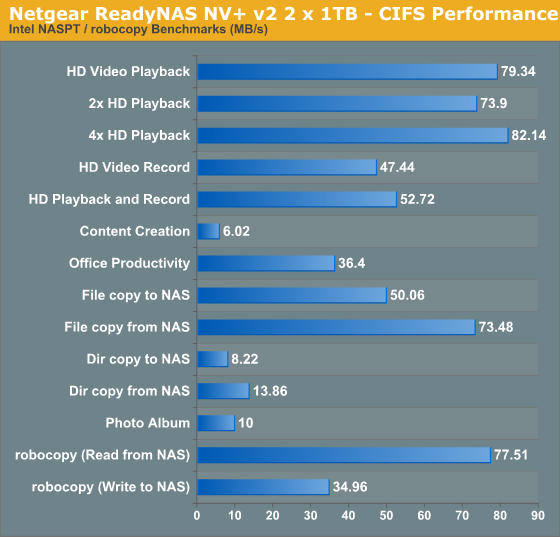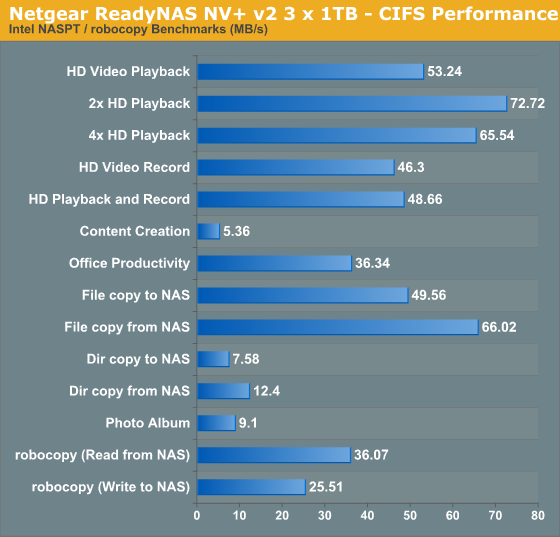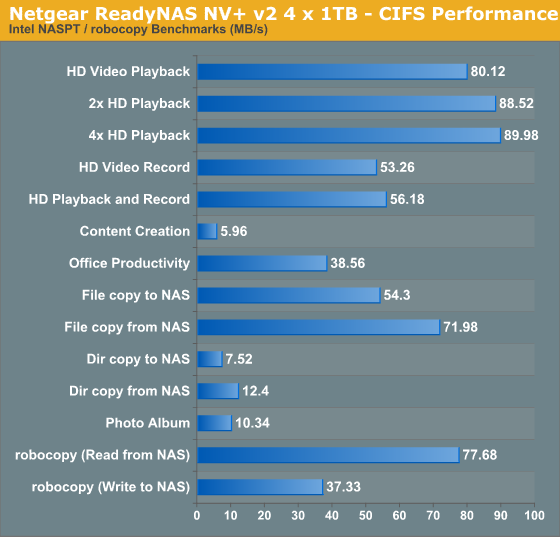Netgear's Marvell Based ReadyNAS NV+ v2 Review
by Ganesh T S on November 9, 2011 8:30 AM EST- Posted in
- IT Computing
- NAS
- NetGear
The ReadyNAS NV+ v2 shipped with 2 x 1TB Hitachi 7200rpm drives. We mapped one of the default shares on our Windows testbed. The Intel NASPT benchmarks were run. In addition, we ran our standard robocopy benchmark to transfer a 10.7 GB Blu-ray folder structure.

Netgear's X-RAID2 solution automatically handles RAID level management and volume expansion as more drives are added. The ReadyNAS website has a very high level explanation of how X-RAID2 works. We added a 1 TB Samsung 7200 rpm drive to the mix and measured the time taken to expand the volume (from RAID-1 to RAID-5).
| X-RAID 2 Volume Expansion | |
| 2 x 1TB RAID-1 to 3 x 1TB RAID-5 | 07:36:25 |
With the new 3 x 1TB configuration, we repeated our NAS benchmarks.

We see a discernible loss in the performance. Does this mean that larger number of drives would tend to lower the performance of the unit? We added another 1TB Samsung 7200 rpm drive in the fourth bay and measured the time taken for volume expansion.
| X-RAID 2 Volume Expansion | |
| 3 x 1TB RAID-5 to 4 x 1TB RAID-5 | 10:31:57 |
With the new 4 x 1TB configuration, the benchmarks were rerun.

We see that the performance is back on track. Note that these numbers compare very favourably with those obtained in the Synology DS-211+ review. At half the price (for the Duo v2), the Netgear units seem to be very good value for the money.
One of the NAS aspects we have started testing recently is RAID rebuild. With all the four bays occupied, a disk failure was simulated by removing the hard drive in the first bay. A Samsung 1 TB hard drive was put in place of the original Hitachi drive in that bay and the time taken for rebuild was recorded:
| ReadyNAS NV+ v2 RAID-5 Volume Rebuild | |
| 4 x 1TB RAID-5 Rebuild after Single Hard Drive Failure | 04:58:29 |
During all stages of the volume expansion / rebuild process, the existing data remained accessible. Operation in degraded mode was made evident in the front display as well as the system health tab in the web interface.










39 Comments
View All Comments
sunbear - Wednesday, November 9, 2011 - link
If it was formatted as ntfs, this could explain the low 20MB/s backup performance. Netgear slumps by using the free ntfs-3g driver whereas qnap licences a ntfs driver from paragon which provides 3-4 times the performance. At this level of performance it would seem that USB 2.0 would have sufficed to handle that low level of performance.It might be worth retesting with ext3 format to see.if performance at USB 3.0 levels is achievable or whether the bottleneck is the weak Marvell CPU.
ganeshts - Wednesday, November 9, 2011 - link
sunbear, Thanks for the note! Yes, it was a NTFS drive.Let me retest with ext3 formatting.
ganeshts - Thursday, November 10, 2011 - link
I retested with ext3, and the results are actually slightly worse than NTFS. But, as you say, NTFS performance could probably get an additional boost with a better driver. We can't say for sure whether that is the case without actually trying out another NTFS driver on the ReadyNAS. I will ask Netgear to analyze this further.sunbear - Thursday, November 10, 2011 - link
Thanks very much for EXT3 the retest. On a NAS that is designed for the budget consumer who will most likely want to backup their NAS via USB (rather than over Ethernet) it's particularly disappointing to see Netgear provide USB3 with the potential for speedy backups, but leave bottlenecks elsewhere effectively nullifying the whole point of having USB3 in the first place! It might be worth asking Netgear why they added the additional cost to include USB3 but then completely failed to utilize it.Regarding the NTFS vs EXT3 performance question - A year or more back it was the case the NTFS backups were slower on Readynas platforms than EXT3 backups, but it seems that the situation may have now reversed due to an update to the ntfs-3g driver to version 2011.1.15 (http://www.tuxera.com/community/release-history) in the most recent versions of the RAIDiator firmware. It now seems that Readynas Ultra 2 users are even finding similar results to your results (http://www.readynas.com/forum/viewtopic.php?p=2902...
MTN Ranger - Wednesday, November 9, 2011 - link
No NFS, no sale. I have a Synology DS210j at work and a DS210+ at home and they provide fast transfers and are reliable.ganeshts - Wednesday, November 9, 2011 - link
Since we have SSH access, it is possible that NFS could be enabled by end-users. I will also put in a word with Netgear :)QChronoD - Wednesday, November 9, 2011 - link
I currently have a 6x 1.5TB drives running on an older Adaptec raid card (in RAID5). Unfortunately it's from right before auto-expansion became popular, so to increase my array I'd have to back it all up, add the new drives, make a new array and then copy everything back over.My question is whether it would be "better" to look into migrating to a NAS (that supports at least 15TB) or a newer RAID card that does support auto-expansion?? A quick look on Newegg showed that once you get over 4bays for the NAS, the cost jumps to $800-1K, and there isn't much thats larger than 6. However I've seen some 16ch RAID cards that are about the same price, and that would give me much greater future expansion.
(I'm not concerned with using a NAS to save power, since my computer is running 24/7 and I'm probably going to upgrade to a Ceton card next year.)
ganeshts - Wednesday, November 9, 2011 - link
The Synology DS1511+ fits your expansion criteria, but it is pretty costly at > $800. unRAID solutions will also work (you can bring your own machine or look into the MD-1510 series). But, all of these are costly.From what I have heard, it is better to go with NAS solutions compared to RAID cards when it comes to 'set it up and forget it' scenarios.
JHBoricua - Wednesday, November 9, 2011 - link
For the $399 asking price of a NV+ v2 diskless unit, I can get a HP Proliant Microserver with a dual core 1.5Ghz low voltage CPU, 2 GB of RAM, 250GB HD, Broadcom gigabit adapter and 2 expansion slots. An additional $99 gets you 8GB of RAM from Crucial. Fill it with 2TB Samsung F4 drives for another $300, slap Solaris 11 with napp.it as the front end and you'll have a much more capable device than the ReadyNAS that can do CIFS, NFS, iSCSI, FCoE, Rsync, WebDav, and much more.ganeshts - Wednesday, November 9, 2011 - link
The issue will be power consumption + customer support. For tech-savvy users, I do suggest going the self-build route, but many SMBs / SOHOs don't have time to build or maintain a NAS themselves.